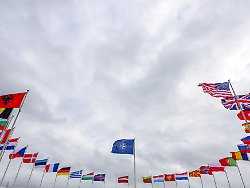NATO, G7 and EU on Ukraine
That is what the crisis summits in Brussels are about
03/24/2022, 07:49 am
Four weeks after the start of the war in Ukraine, NATO, the EU and the seven leading industrialized countries meet in Brussels. The three summits will include further support for Ukraine and new measures against Russia. US President Joe Biden has also traveled to the event.
Three summits are taking place this Thursday in Brussels to discuss Russia’s war of aggression against Ukraine. The program includes a special NATO summit as well as summits of the European Union and the seven leading democratic economic powers (G7). Among other things, the top-level meetings will deal with further support for Ukraine and new measures against Russia. The Ukrainian President Volodymyr Zelenskyj is to be connected via video at all three meetings.
US President Joe Biden also traveled to Brussels to attend the three summits. White House National Security Advisor Jake Sullivan told reporters on the flight that the US hopes “that the determination and unity” from Western allies “that we’ve seen over the past month will last as long as needed.” He reiterated: “This war will end neither easily nor quickly.” Sullivan also said that the new package of sanctions against Russia announced for Thursday “will apply to political figures, oligarchs … as well as to companies”.
According to Sullivan, during the consultations in Brussels, the allies also want to discuss how “effective action can be taken against Russian attempts to circumvent the sanctions.” According to the security adviser, the United States wants to “closely monitor” China’s role in the Ukraine war. Biden will “certainly discuss the issue of China’s possible involvement in the Ukraine conflict while he is in Brussels,” Sullivan said. He will address this both at NATO and at the meeting with EU leaders. Against this background, Sullivan referred to an EU-China summit on April 1 and said: “We believe that we are on the same wavelength as our European partners”.
NATO summit: Focus on strengthening combat troops
Because of the Russian attack on Ukraine, NATO wants to strengthen its combat troops in the eastern member countries. According to Secretary General Jens Stoltenberg, a political decision is expected for four new multinational warfare units in Romania, Bulgaria, Hungary and Slovakia. That would be a doubling of the so-called Battlegroups that have been stationed in Poland and the Baltic states. Germany recently expanded its NATO presence in Lithuania and announced soldiers for Slovakia.
According to NATO information, the United States currently has around 100,000 soldiers stationed in Europe, plus 40,000 on increased operational readiness under NATO command. NATO has invited Zelenskyy to give a video address on the “catastrophic situation” in his country, as an alliance representative said. Selenskyj had repeatedly appealed to the alliance to set up a no-fly zone over Ukraine to stop Russian attacks from the air.
However, this further excludes the alliance. “NATO will not intervene militarily in this war” – this is how Chancellor Scholz put it last week, and he reiterated this on Wednesday in the Bundestag. The danger of a world war would be too great.
G7 meeting: New sanctions against Russia
The 30 allies are very concerned about the possible use of chemical or other weapons of mass destruction by Russia in Ukraine. US President Biden warned Kremlin chief Vladimir Putin against a “strong” response from NATO in this case. Russia is said to have previously used hypersonic missiles against Ukraine, which could theoretically be equipped with nuclear weapons.
After the NATO summit, Chancellor Scholz, as acting G7 President, wants to consult with Biden and the top representatives of France, Italy, Canada, Great Britain and Japan. In his subsequent press conference, Scholz could address the topic of new sanctions against Russia, which Washington has already promised. At the beginning of the week, Biden coordinated with Scholz and the other European G7 countries by telephone.
EU summit: “Solidarity” fund for Ukraine
The EU summit, to which Biden has been invited as a guest, will also deal with a further tightening of sanctions against Russia from Thursday afternoon. Germany in particular is under pressure to lift its opposition to an oil and gas embargo on Russia. Scholz again rejected this in the Bundestag because it would “plunge our country into recession”. At its two-day summit, the EU wants to set up a “solidarity” fund to support Ukraine, according to a draft of the summit conclusions. The funds are to come from an international donor conference.
The EU had previously launched crisis aid worth 1.2 billion euros for Ukraine. In addition, the Europeans want to double their military aid for the country to one billion euros. The European heads of state and government also want to approve a new security strategy. It envisages a rapid EU intervention force with up to 5,000 soldiers from 2025. The federal government has offered to provide the core of this new unit in the first year.
Another topic is likely to be humanitarian aid for war refugees from Ukraine. According to the UN refugee agency, around 3.6 million people have left Ukraine since the war began. No other country has taken in as many Ukraine refugees as neighboring Poland.
Despite all the demonstrative unity: there is a risk of a dispute at the EU summit on the subject of energy. Countries like Spain and Greece have been demanding European action against the massive rise in gas and fuel prices for months, so far without a breakthrough. Tough negotiations are expected again.
